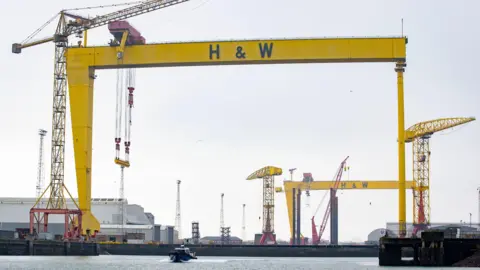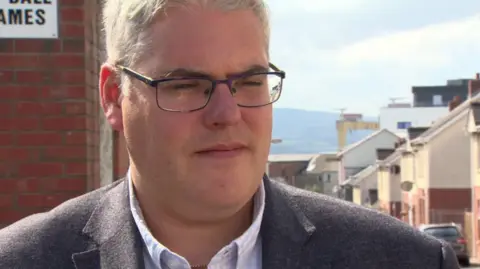By John Campbell, BBC News NI economics and business editor
 PA
PAThe government is due to explain why it has refused to give financial support to Harland and Wolff.
The loss-making shipbuilder, which employs 1,500 people across the UK, had applied for a loan guarantee of up to £200m.
On Friday it said its bid had been unsuccessful and that its chief executive had left his job.
The company is in talks with its lender, Riverstone, and is hopeful of agreeing additional funding within days.
However that still leaves questions about its long-term future.
The company’s shares are currently suspended after it failed to file audited accounts on time.
It has appointed Rothchilds bank to review strategic options which could include a sale of the business.
The Business Secretary, Jonathan Reynolds, is due to give a written statement to Parliament later on Monday.
The GMB union, which represents many of the shipyard’s workers in Belfast, said staff were concerned about the situation but were hopeful for a resolution.
“There is genuine fear, but certainly on the ground it is business as usual and our members are turning up for work today to carry out their roles,” said GMB senior organiser Alan Perry.
“Yes it’s a wee bit rocky at this moment in time, but certainly the feedback that we’re getting is that there will be some sort of package and they will be able to deliver on the contracts in relation to the Royal Navy ships,” he told Radio Ulster.
Mr Perry said the union will meet management on Tuesday morning but he added that there were no indications coming directly from the firm that they should be concerned about the shipyard.
“Hence why we are quite positive that the future for many years to come will be secure,” he said.
‘Government must show commitment to ship building’
East Belfast MP Gavin Robinson said there has been a “great deal of uncertainty” in the last number of weeks due to speculation that has arose over the loan guarantee.
“The government have chosen not to proceed with it on the basis for value for money,” he told BBC News NI’s Good Morning Ulster programme.
Mr Robinson said contracts, including a £1.6bn Ministry of Defence contract to build three Royal Navy support ships, puts the shipyard in a much more positive position than five years ago when it went into administration.
“What I want to hear from government today is not just the reasons why they made the decision, but their commitment to ship building in Belfast,” he added.
“They’ve given positive noises to that up until now and I need to see that guarantee to reassure people who are building, working in the yard, building their future in the yard, [who] want to see that clarity from government.”

Harland and Wolff employs about 1,500 people, mainly at its Belfast shipyard as well as at two smaller facilities in Scotland and one in England.
In 2023 it was part of a consortium which won a major contract to build three Royal Navy support ships.
The company has had to invest significantly to prepare for that work which has contributed to its large losses.
It has also taken on loans from Riverstone which charge a high rate of interest.
It had hoped to use a government guarantee to refinance those loans at a lower interest rate and take on more borrowing.
That would have involved borrowing up to £200m from a consortium of UK banks with government acting as guarantor – meaning if the loans were to go bad the state would have to step in to repay the lenders.

